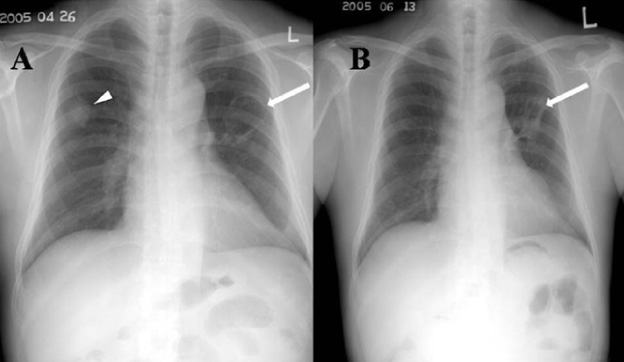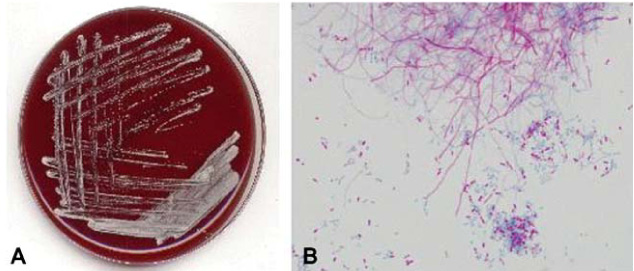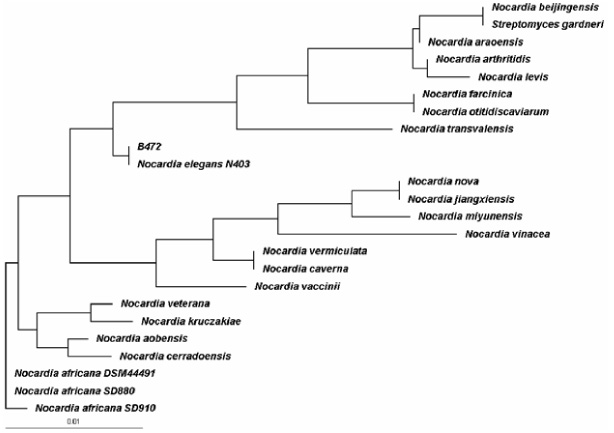Infect Chemother.
2008 Apr;40(2):116-120. 10.3947/ic.2008.40.2.116.
A Case of Lung Abscess Caused by Nocardia elegans in a Kidney Transplantation Recipient
- Affiliations
-
- 1Department of Internal Medicine, Asan Medical Center University of Ulsan College of Medicine, Seoul, Korea.
- 2Department of Laboratory Medicine, Asan Medical Center University of Ulsan College of Medicine, Seoul, Korea. sung@amc.seoul.kr
- 3Department of Surgery, Asan Medical Center University of Ulsan College of Medicine, Seoul, Korea.
- KMID: 2230015
- DOI: http://doi.org/10.3947/ic.2008.40.2.116
Abstract
- Nocardiosis is well-known opportunistic infection in immunocompromised patients. The timely diagnosis and treatment, however, is still a difficult problem. Recently, as newer molecular techniques, particularly 16S rRNA sequencing, are implemented, the diagnosis and management of the infection are improving. We report a case of lung abscess in a 39-year-old-man who underwent kidney transplantation. He was diagnosed of Nocardia elegans by 16S rRNA sequencing and was cured of the infection with appropriate antibiotic therapy.
Keyword
MeSH Terms
Figure
Cited by 1 articles
-
A Case of Disseminated Nocardiosis by Nocardia brasiliensis after Steroid Injection
Na Ra Yun, Hee Jeong Lee, Su Jin Hong, Jun Lee, Dong-Min Kim, Sook Jin Jang, Ran Hong
Infect Chemother. 2011;43(4):367-371. doi: 10.3947/ic.2011.43.4.367.
Reference
-
1. Beaman BL, Burnside J, Edwards B, Causey W. Nocardial infections in the United States, 1972-1974. J Infect Dis. 1976. 134:286–289.
Article2. Lerner PI. Nocardiosis. Clin Infect Dis. 1996. 22:891–903.
Article3. Wellinghausen N, Pietzcker T, Kern WV, Essig A, Marre R. Expanded spectrum of Nocardia species causing clinical nocardiosis detected by molecular methods. Int J Med Microbiol. 2002. 292:277–282.
Article4. Relman DA. Persing DH, Smith TF, Tenover FC, White TJ, editors. Universal bacterial 16S rRNA amplification and sequencing. Diagnostic molecular microbiology priniciples and applications. 1993. 1st ed. Washington DC: ASM Press;489–495.5. Woo PC, Ng KH, Lau SK, Yip KT, Fung AM, Leung KW, Tam DM, Que TL, Yuen KY. Usefulness of the MicroSeq 500 16S ribosomal DNA-based bacterial identification system for identification of clinically significant bacterial isolates with ambiguous biochemical profiles. J Clin Microbiol. 2003. 41:1996–2001.
Article6. Nolte FS, Caliendo AM. Murray PR, Baron EJ, Pfaller MA, Tenover FC, Yoken RH, editors. Molecular detection and identification of microorgnisms. Manual of clinical microbiology. 2007. 9th ed. Washington DC: ASM Press;218.7. National Committee for Clinical Laboratory Standards (NCCLS). Approved Standard. NCCLS document M24-A. Susceptibility testing of mycobacteria, Nocardiae, and other aerobic actinomycetes. 2003. Wayne, Pennsylvania, USA: NCCLS.8. Peleg AY, Husain S, Qureshi ZA, Silveira FP, Sarumi M, Shutt KA, Kwak EJ, Paterson DL. Risk factors, clinical characteristics, and outcome of Nocardia infection in organ transplant recipients: a matched case-control study. Clin Infect Dis. 2007. 44:1307–1314.
Article9. Yassin AF, Brenner S. Nocardia elegans sp. nov., a member of the Nocardia vaccinii clade isolated from sputum. Int J Syst Evol Microbiol. 2005. 55:1505–1509.
Article10. Goodfellow M, Orchard VA. Antibiotic sensitivity of some nocardioform bacteria and its value as a criterion for taxonomy. J Gen Microbiol. 1974. 83:375–387.
Article11. Watanabe K, Shinagawa M, Amishima M, Iida S, Yazawa K, Kageyama A, Ando A, Mikami Y. First clinical isolates of Nocardia carnea, Nocardia elegans, Nocardia paucivorans, Nocardia puris and Nocardia takedensis in Japan. Nippon Ishinkin Gakkai Zasshi. 2006. 47:85–89.
Article12. Agterof MJ, van der Bruggen T, Tersmette M, ter Borg EJ, van den Bosch JM, Biesma DH. Nocardiosis: a case series and a mini review of clinical and microbiological features. Neth J Med. 2007. 65:199–202.13. Munoz J, Mirelis B, Aragon LM, Gutierrez N, Sanchez F, Espanol M, Esparcia O, Gurgui M, Domingo P, Coll P. Clinical and microbiological features of nocardiosis 1997-2003. J Med Microbiol. 2007. 56:545–550.
Article14. Simpson GL, Stinson EB, Egger MJ, Remington JS. Nocardial infections in the immunocompromised host: A detailed study in a defined population. Rev Infect Dis. 1981. 3:492–507.
Article15. Beaumont RJ. Trimethoprim as a possible therapy for nocardiosis and melioidosis. Med J Aust. 1970. 2:1123–1127.
Article16. Choucino C, Goodman SA, Greer JP, Stein RS, Wolff SN, Dummer JS. Nocardial infections in bone marrow transplant recipients. Clin Infect Dis. 1996. 23:1012–1019.
Article
- Full Text Links
- Actions
-
Cited
- CITED
-
- Close
- Share
- Similar articles
-
- Case Report: Endogenous Nocardial Endophthalmitis in a Renal Transplant Recipient
- A Case of Empyema Thorax and Intraabdominal Abscess caused by Nocardiac Species
- A Case of Disseminated Nocardiosis in Kidney Transplant Recipient
- A Case of a Kidney Transplant Recipient with Pulmonary Cytomegalovirus and Nocardia Coinfection with Cytomegalovirus Nephropathy
- Nocardia Brain Abscess in a Liver Transplant Recipient




